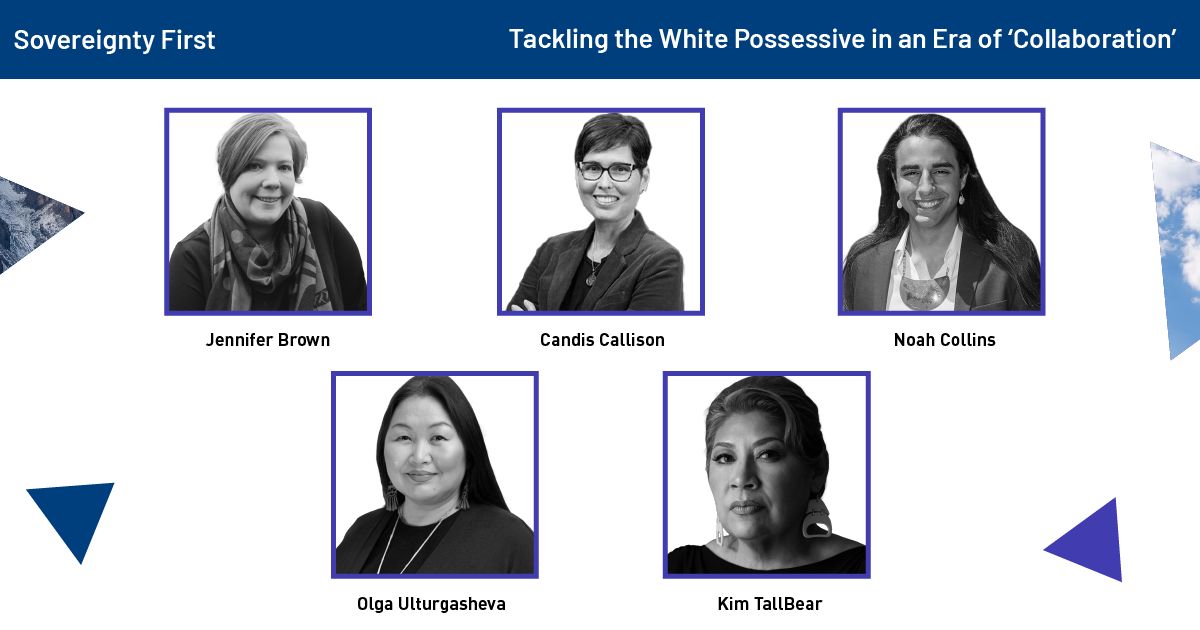Euro-Western academia, politics, governance, science, art, literature, and law claim to be uplifting and celebrating Indigenous peoples and ideas more than ever, yet some reconciliatory and recognition-based frameworks still undermine Indigenous sovereignty and global Indigenous solidarities. This event will unpack this harmful contradiction, which Goenpul scholar Aileen Moreton-Robinson calls the ‘possessive logics of patriarchal white sovereignty’.
Drawing on their work, five dynamic panelists will explore ways to disrupt, dismantle, and transform the pervasive reach of this ‘white possessive’ as it cloaks itself in new robes to maintain its control over Indigenous lands, relations, and existence.
Panelists Include:
Jennifer Brown – University of Alaska Southeast
Jennifer Brown is an Assistant Professor of Anthropology and Alaska Native Studies at the University of Alaska-Southeast in Ketchikan, Alaska, and is pursuing her Ph.D. in anthropology from the University of Pennsylvania. In the past, she worked as a tribal health researcher for Southcentral Foundation in Anchorage, Alaska. She is a member of the Kaigani Haida and the Ketchikan Indian community in Ketchikan, Alaska. Her research draws on science and technology studies (STS), environmental studies, and indigenous critical theory to examine human responses to climate change in Southeast Alaska.
Candis Callison – The University of British Columbia
Candis Callison is the Canada Research Chair in Indigenous journalism, media, and public discourse and an Associate Professor at the University of British Columbia, jointly appointed in the School of Public Policy and Global Affairs and the Institute for Critical Indigenous Studies. She is the author of How Climate Change Comes to Matter: The Communal Life of Facts (Duke U Press, 2014) and the co-author of Reckoning: Journalism’s Limits and Possibilities (Oxford U Press, 2020). Candis is currently working on a long-term research project about the role of journalism and media in Arctic and northern regions. She is a member of the Tahltan Nation and a regular contributor to the podcast, Media Indigena.
Noah Collins – Princeton University
Noah Collins (White Mountain Apache Tribe/Cherokee Nation) is a graduate student in Anthropology at Princeton University. His research interests broadly concern Indigenous health disparities. He has worked extensively in genomics, bioethics, and community based participatory research in multiple domestic and international Indigenous peoples groups. His most recent research has been to identify globally rare gene variants for use in creating therapeutics to treat areas of unmet medical need. Noah’s research Indigenizes western processes to empower Indigenous people to establish systems that uphold their individual belief systems. At Princeton, Noah wants to explore the natures of engagement and sovereignty in global Indigenous communities beginning their interactions with biomedical research
Kim TallBear – University of Alaska
Kim TallBear (Sisseton-Wahpeton Oyate) is Professor and Canada Research Chair in Indigenous Peoples, Technoscience, and Society, Faculty of Native Studies, University of Alberta. She is the author of Native American DNA: Tribal Belonging and the False Promise of Genetic Science. In addition to studying genome science disruptions to Indigenous self-definitions, Dr. TallBear studies colonial disruptions to Indigenous sexual relations. She is a regular panelist on the Media Indigena podcast. She is also a regular media commentator on topics including Indigenous peoples, science, and technology; and Indigenous sexualities. You can also follow her Substack newsletter, Unsettle: Indigenous affairs, cultural politics & (de)colonization.
Olga Ulturgasheva – The University of Manchester
Olga Ulturgasheva is an Associate Professor/Senior Lecturer in Social Anthropology at the University of Manchester, UK. She is an Indigenous scholar and a member of the Siberian Eveny. Over the last fifteen years she has been engaged in a number of anthropological and cross-disciplinary studies exploring human and non-human personhood, Indigenous childhood and youth, climate change, resilience and adaptation patterns in Siberia and American Arctic. She is an author of Narrating the Future in Siberia: Childhood, Adolescence and Autobiography among the Eveny (Berghahn Books 2012) and co-editor of Animism in Rainforest and Tundra: Personhood, Animals, Plants and Things in Contemporary Amazonia and Siberia (Berghahn 2012). Her latest book is a co-edited volume Risky Futures: Climate, Geopolitics and Local Realities in the Uncertain Circumpolar North (Berghahn Book 2022) focusing on the latest implications of climate change for our understanding of environmental risk, human-non-human adaptations, co-production of knowledge and collaboration. Currently, she serves as a Principal Investigator of a large international, collaborative research project funded the European Research Council (ERC).
Speakers Include:
Wenona Hall – Chair of the Indigenous Studies Department, SFU
Wenona Hall is a member of the Sq’ewqéyl First Nation and is an Associate Professor and the Chair of the Indigenous Studies Department at Simon Fraser University. Dr. Hall is a mother to three young adults Jade, Justice and Alexis, and is the oldest grand-daughter of Gordon and Blossom Hall. Her parents are Bob Hall Sr. (Sq’ewqéyl) and Donna Kickbush (Settler). Dr. Hall will provide opening statements at this event.
Zoe Todd – Moderator
Zoe (Canada Research Chair, Tier 2, Indigenous Governance and Freshwater Fish Futures) is a Red River Métis fish philosopher, artist, and activist-scholar from Alberta working towards establishing better ways to honour collective human obligations to fish in the prairies.



